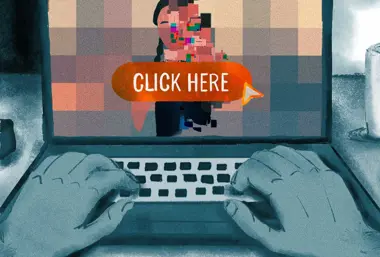
Child sexual abuse material vs ‘child porn’: why language matters
There is No Such Thing as ‘child pornography’.
Published: Thu 7 Apr 2016
Harriet Lester, IWF Technical Projects Officer
If you live on social media like I do, then you’ll have probably noticed BBC Three’s increased presence on your Facebook news feed. It’s because they’ve taken the decision to move the whole service away from television and onto their newly designed website, where they can better reach their twenty-somethings target audience.
It’s quite a big shape-up. As well as a site with big bold colours and an edgier logo, BBC Three has introduced mini ‘docs’, or documentaries, about three minutes in length covering niche topics with titles like: My foray into the world of amputee pornography and 15 and on steroids.
Things I can’t unsee is a series of mini docs that BBC Three is releasing as part of their re-launch. So far the series has provided rare and thought-provoking insight into the working lives of Bradford taxi drivers and UK firefighters – both with dark and harrowing stories. The latest film to be launched as part of the Things I can’t unsee series is about the IWF, and it’s available online right now for you to watch.
I’m currently the Technical Projects Officer at the IWF but I used to be an Internet Content Analyst, so I was asked to be in the documentary. It’s a really powerful little film that gives you an emotional and honest insight into the people whose job it is to see young boys and girls be sexually abused, day-in-day-out. The job is really tough and only a very small number people are able to do it – and this film is about them.
What’s also really important about this film is that it has the potential to communicate the work of the IWF directly to young people, specifically young men, who might not be familiar with us as an organisation. We think it’s crucial that this demographic is aware of us. We know that young men are the most likely to stumble across images and videos of child sexual abuse, but we also know that they’re the least likely to report them if they do stumble across them. You’ll probably never stumble across these images, and I hope you never do, but in the event that you do, wouldn’t you want to know where you could report them? Especially if you knew you could report them completely anonymously?
I urge you to check it out and learn a bit more about the challenges that this awful, awful crime poses and how we at the IWF are fighting it stronger than ever.
Ends
Notes to editors:
Contact: Lisa Stacey, IWF Communications Manager +44 (0) 1223 203030 or +44 (0) 7929 553679.
What we do:
We make the internet a safer place. We help victims of child sexual abuse worldwide by identifying and removing online images and videos of their abuse. We search for child sexual abuse images and videos and offer a place for the public to report them anonymously. We then have them removed. We’re a not for profit organisation and are supported by the global internet industry and the European Commission.
For more information please visit www.iwf.org.uk
The IWF is part of the UK Safer Internet Centre, working with Childnet International and the South West Grid for Learning to promote the safe and responsible use of technology.

There is No Such Thing as ‘child pornography’.